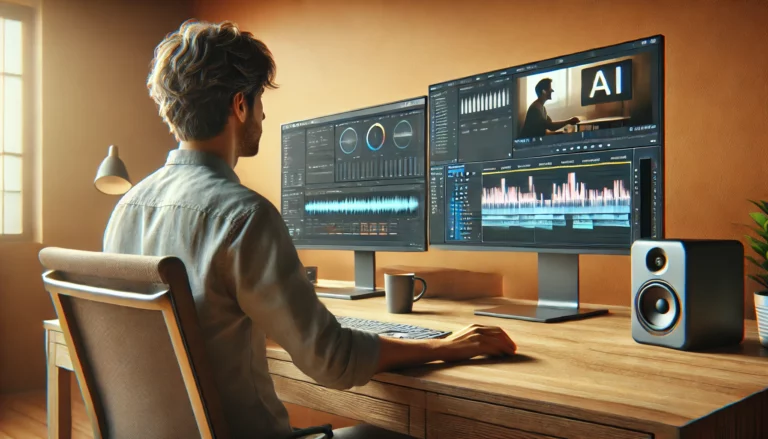Creating a video project is not an easy task. The process is long and arduous, and one of its most important aspects is video editing. Whether you are creating a marketing campaign, a corporate video, or a music video for an up and coming artist, editing is extremely crucial. Without a video editor, your project may not get the results you deserve. So learning how to become a video editor can provide excellent career opportunities.
A video editor is responsible for manipulating video footage to create a cohesive project that depicts the director’s vision effectively. These experts use complex software to piece different videos together and add animation, sound effects, and voice-overs.
What Does a Video Editor Do?
A video editor’s duties vary depending on each project they undertake. Generally, it includes meeting with directors and producers to determine the vision of their project. These professionals also need to review raw material to determine what makes it to the final shot list. Through this, they can maintain the continuity of shots and ensure that the entire video follows an easily understandable sequence.
As you may expect, the projects of video editors are more complex than the small edits you make for your holiday vacation. For instance, a video editor working for a wedding video may need to look through footage from three to five different cameras, each running for a couple of hours, just to create one 10-minute long video.
Video editing is usually done in an office, although there are now more doors for freelance video editing work. With this type of set-up, professionals can work from the comfort of their homes. Either way, they would not be tasked to spend time on the shoot itself.
Requirements to Become a Video Editor
Video editors usually come from a media background. There are jobs for video editors that require them to have a bachelor’s degree in editing, television studies, or film production. But for most jobs, employers are not interested in your degree, but your ability to do the project.
Video editors also need to have the ability to work with software programs like Premiere Pro or Final Cut. Other than these skills, they also need to be good at communicating and understanding clients to enable their overall vision to come to life. A thorough understanding of lighting is also crucial to produce quality work.
Stages of Video Editing
Video editing is made up of different stages that need to be followed to ensure the quality of the post-production output. The stages mentioned below are sequenced to give more efficiency to each professional since each step builds upon what is done in the previous stage.
Preproduction
You may think a video editor will only be involved in the post-production phase, but this expert actually steps in the moment the storyboard is crafted. A video editor needs to study the storyboard to know when to cut each shot.
Dailies
Usually, more videos will be shot compared to what will be used in the final edit. If you view all videos after the production has wrapped, you will be wasting a lot of time. It is recommended to review the dailies that come to get a jump start on your edit. This will allow you to digest the video in smaller chunks.
Rough cut
One key step in knowing how to become a video editor is learning how to make a rough cut. This pertains to the first edit of the video. It doesn’t need to be perfect. At this stage, what’s important is organizing the footage and crafting a message that aligns with the director’s vision.
One key aspect of a rough cut is timing. A video editor is in charge of the timing of the video more than any other professional in the production. It is in the rough cut that you start to determine this element, whether you are making extended pauses or fast cuts. This will also dictate the video’s emotional connection with the viewers.
Final cut
Making the final cut is one of the most vital parts of a video editor’s job. Here, the timing and cutting off all footages are finalized. It’s not the final version yet, but it needs to be very close to the copy that will be broadcasted.
The video at this stage is also known as the frame or picture lock. Meaning, the frames in this edit should not be changed moving forward. Aside from locking videos down, another aspect of the final cut stage is elimination. A scene may be finalized. However, this doesn’t automatically assure that it will be part of the production. The director and producer still need to review it.
Color grading and color correction
Unless you are working on a big project, you will also be tasked with the color grading process. Color grading refers to adjusting the color of the source video. When a camera records something, it collects digital data and translates it to a format that can easily be viewed. However, no camera does this perfectly, and this is why you need to be familiar with color profiles.
The first step in color grading is normalizing the video clips by fixing the saturation and contrast. After this, you can move on with color correcting the footage to make it as accurate as possible. If the exposure, contrast, or saturation are off, the color grading process will be more difficult. Finally, you need to add a certain color tint to the videos and alter tones as needed.
Salary of a Video Editor
In today’s video-laden media landscape, video editors will always be in demand, and that is a trend that will continue for the next decade. The salary of video editors varies depending on their previous work experience and background, but just like other jobs, those with more years of experience under their belt may charge a higher fee. The average video editor earns between $48,000 to $72,000 annually.
Ways to Get Experience as A Video Editing Newbie
Everyone in the industry will encounter the problem of trying to land gigs without experience. Here are some ways you can get over this hurdle.
Educate yourself
Knowing how to become a video editor is hard, but you can improve your skills by taking classes, getting more certificates and diplomas, and attending workshops. All these will help you get the knowledge you need and show your commitment and dedication to your passion. Not only that, but these training sessions will also help you have something to showcase on your portfolio.
Work your way up
One awesome way to gain experience in a specific video editing area is to work for little money. We know it doesn’t sound great, but it will enable you to get your name out there and get your foot through different doors. Try to intern, freelance, or get training from an experienced professional or company.
Diversify your network
Another tip on how to become a video editor is to get a friend or a colleague to recommend you. But before this can happen, you need to cultivate your professional network online and offline. Make sure that when you meet or talk to people, you are armed with an elevator pitch and a great resume you can point them to.
Make a great CV
Making a CV when you’re a newbie is tough work. You need to plan this hard. Start by listing all experience, personality traits, and skills that will help you land any role. Then, list the experience, personality traits, and skills that you already have. Use this as a reference to see what areas you can improve on and what you can highlight in your cover letter and CV.
Additionally, you also need to have a good career-starting story that will enable you to captivate the attention of your future employers. Your potential employers will ask you questions during the interview process, so it is important to have a concise answer as to why you are the right person for the job. This is where you need to impress people with your passion for video editing. Don’t forget to throw in your skills, experiences, and educational background.
Focus on soft skills
Putting soft skills on your CV shows employers that you have the personal attributes you need to succeed as a video editor. Soft skills include leadership skills, communication skills, organizational skills, and interpersonal skills. All these concern your ability to multitask, motivate team members, and supervise other editors. Make sure to showcase these skills in your CV.
Become an expert
If you want to become a great video editor, you need to learn the ropes of the industry. This will prepare you for an amazing career and help you when you need to network or get interviewed for a job.
To become an expert, invest time and effort training yourself, interacting in professional forums, or reading books and blogs about video editing. Also, make sure you are familiar with key icons in the business nationally and internationally.
Practice other essential skills
When working as a video editor, you need to follow strict deadlines. This means you need to edit videos very fast. Editing fast requires you to have extensive knowledge of software shortcuts to the point where you can do it even without conscious thought. Aside from good finger reflexes, you also need to practice judging the pacing and timing of videos since it can affect the final output.
Be patient
When you’re still starting out as a newbie video editor, you need to be willing to climb your way up. The whole journey may seem exhausting sometimes, but if your passion really lies in video editing, you can do it.
Now You Know How to Become an Editor
Editors are considered invisible yet essential storytellers. They are the ones that work so hard to create the pace, feeling, flow, and tone of the story. If you want to know how to become a video editor, you need to realize that editing is more than just cutting videos. It’s about conveying stories accurately. It’s a challenging art form, but with dedication, practice, and experience, you can do it. If you are looking for new opportunities in video editing, become part of Bunny Studio or let our experts handle your video editing needs.











